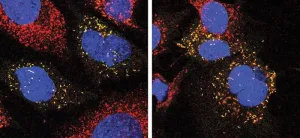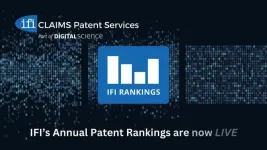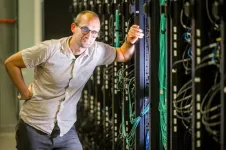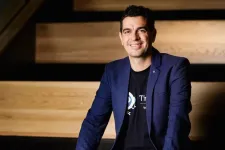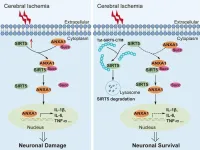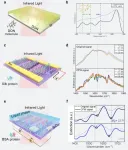(Press-News.org) For the first time, a research team at The Hospital for Sick Children (SickKids) has uncovered a way to potentially reduce the amount of toxic cellular waste accumulating in patients with Zellweger Spectrum Disorder (ZSD).
ZSD is a group of rare, neurodegenerative genetic conditions caused by genetic variations that reduce the number of peroxisomes – the parts of cells that are responsible for, among other tasks, breaking down fats. ZSD varies in severity and is characterized by progressive neurodegeneration as well as symptoms that range from visual impairments, such as cataracts, to liver and kidney disfunction.
Like all living things, cellular structures break down over time and must be recycled. In cells, this recycling process is called autophagy. Autophagy in people with ZSD is affected by the lack of working peroxisomes that ultimately causes damage to other parts of the cell, resulting in a buildup of toxic cellular waste that can be fatal. Until now, the connection between peroxisome loss and the disruption in the recycling process in ZSD was unknown.
In a study published in Nature Communications, researchers led by Dr. Peter Kim, a Senior Scientist in the Cell Biology program at SickKids, and Dr. Robert Bandsma, a Scientist in the Translational Medicine program, discovered that by genetically and pharmaceutically increasing a cell’s ability to recycle its own components it is possible to clear damaged cellular material, providing a new therapeutic target for treating ZSD.
Looking closely at cellular recycling
There are more than a dozen known pathways that recycle specific damaged or irrelevant components in a cell. One of these pathways is pexophagy which selectively recycles peroxisomes.
Previous research from the Kim-Bandsma team found that the most common genetic variation that causes ZSD significantly increases pexophagy, causing healthy peroxisomes to get recycled alongside unhealthy ones. In the new study, Dr. Kyla Germain, a former graduate student in Kim and Bandsma’s labs, found that this increase in pexophagy can also prevent cells from degrading other cellular waste.
“Our work demonstrates for the first time that different cellular recycling pathways can influence one another,” Germain explains. “A cell’s recycling system has a maximum load capacity – an autophagic limit. When this limit is exceeded, toxic cellular waste will accumulate.”
After locating this connection between different recycling pathways, researchers found they could optimize the overall recycling process by increasing the autophagic limit. In doing so, they observed improved clearance of cellular waste, which opens new pathways to treat ZSD.
“These results are exciting as they show that through understanding a fundamental process that takes place in all our cells, we can potentially develop new and better treatments for a very serious condition,” says Bandsma, who is also a Staff Physician in the Division of Gastroenterology, Hepatology and Nutrition at SickKids.
Informing care beyond ZSD
The research team is hopeful that findings from this study may inform research in other neurodegenerative conditions that are associated with changes in autophagy, such as Huntington’s disease and Parkinson’s disease.
“We identified that protein aggregates involved in Huntington’s disease and Parkinson’s disease can also prevent the turnover of damaged peroxisomes, which means scientists may be able to target these components in patients outside the field of ZSD,” Kim says.
The Kim-Bandsma team’s next step is to take this research into a pre-clinical ZSD models to test various therapeutics that could either increase autophagy or inhibit pexophagy. These studies will be done using the expertise at the SPARC Drug Discovery core facility at SickKids.
This work was supported by the Canada Institutes of Health Research (CIHR), the Ontario Graduate Scholarship, a Hayden Hantho Award and the Hilda and William Courtney Clayton Paediatric Research Fund.
END
Improved cellular recycling could benefit patients with neurodegenerative conditions
2024-01-09
ELSE PRESS RELEASES FROM THIS DATE:
Green ammonia could decarbonize 60% of global shipping when offered at just 10 regional fuel ports
2024-01-09
A study published today in IOP Publishing’s journal Environmental Research: Infrastructure and Sustainability has found that green ammonia could be used to fulfil the fuel demands of over 60% of global shipping by targeting just the top 10 regional fuel ports. Researchers at the University of Oxford looked at the production costs of ammonia which are similar to very low sulphur fuels, and concluded that the fuel could be a viable option to help decarbonise international shipping by 2050.
Around USD 2 trillion will be needed to transition to a green ammonia fuel supply chain by 2050, primarily to finance ...
Samsung leads again in U.S. patents while Qualcomm leaps into second place; overall grants dip 3.4%
2024-01-09
New Haven, Conn., Jan. 9, 2024—U.S. patent grants declined 3.4% from 2022, the lowest level since 2019, and Samsung held onto the top spot for the second year in a row according to IFI CLAIMS Patent Services, world leader in tracking patent application and grant data.
IFI CLAIMS Patent Services is a Digital Science company that compiles and tracks data from the U.S. Patent and Trademark Office (USPTO) and other patent-issuing agencies around the globe. IFI translates its world-leading data into an annual U.S. Top 50 and IFI Global 250 patent rankings, providing valuable insights into companies’ R&D activity.
Other findings in IFI’s latest rankings include patent powerhouse ...
Severe MS predicted using machine learning
2024-01-09
A combination of only 11 proteins can predict long-term disability outcomes in multiple sclerosis (MS) for different individuals. The identified proteins could be used to tailor treatments to the individual based on the expected severity of the disease. The study, led by researchers at Linköping University in Sweden, has been published in the journal Nature Communications.
“A combination of 11 proteins predicted both short and long-term disease activity and disability outcomes. We also concluded that it’s important to measure ...
Combining anti-tumor drugs with chemo may improve rare children’s cancer outcomes
2024-01-09
Children who develop neuroblastomas, a rare form of cancer which develops in nerve cells, may benefit from receiving certain anti-tumour drugs as well as chemotherapy, a new trial has found.
The results of the BEACON trial conducted by the Cancer Research UK Clinical Trials Unit at the University of Birmingham found that combining anti-angiogenic drugs, which block tumours from forming blood vessels, alongside various chemotherapy drugs led to more young people seeing their tumours shrinking, from 18% in the control group to 26% among those on Bevacizumab.
The findings are published in the Journal of Clinical Oncology today. The trial saw 160 young ...
EBRAINS research infrastructure secures €38 million in funding for new phase of digital neuroscience
2024-01-09
The European Commission has accepted the EBRAINS 2.0 proposal submitted in response to the INFRASERV call, granting €38 million for the further development of services of the EBRAINS research infrastructure.
The European Commission has signed a grant agreement to fund EBRAINS with €38 million until 2026. Over the next three years, the infrastructure will continue to develop tools and services to widely serve research communities in neurosciences, brain medicine, and brain-inspired technologies.
EBRAINS (European Brain Research Infrastructures) is an EU co-funded collaborative research platform designed to advance neuroscience and brain ...
Train your brain to overcome tinnitus
2024-01-09
An international research team has shown that the debilitating impact of tinnitus can be effectively reduced in just weeks by a training course and sound therapy delivered via a smartphone app.
The team from Australian, New Zealand, French and Belgian universities report these findings today in Frontiers in Audiology and Otology.
It offers some hope for millions affected by tinnitus who:
have been told that there is nothing they can do about it
face long queues waiting for treatment, or
can’t afford the costs of specialist support.
The initial trial worked with 30 sufferers, of whom almost two thirds experienced a ‘clinically ...
A chemical reaction key to various industries just got greener
2024-01-09
Osaka, Japan – From alleviating your allergy symptoms to optimizing herbicide performance, alkylamines are molecules that have many uses. Unfortunately, common methods of producing alkylamines result in harmful waste byproducts. A method of synthesizing alkylamines in a sustainable yet cost-effective way has thus been highly sought after.
Now, in a study recently published in Green Chemistry, a research team led by Osaka University has found a way. The team has developed a method of alkylamine synthesis that works under mild conditions and produces ...
Spanish butterflies better at regulating their body temperature than their British cousins
2024-01-09
Butterfly populations in Catalonia in northern Spain are better than their UK counterparts at regulating their body temperature by basking in the sunshine, but rising global temperatures due to climate change may put Spanish butterflies at greater risk of extinction.
An international study, led by the University of Cambridge and the Institut de Biologia Evolutiva (IBE) in Barcelona, found that butterflies use different methods to regulate their body temperature. In Catalonia, butterflies tend to angle ...
A novel cell-penetrating peptide exerts therapeutic effects against ischemic stroke
2024-01-09
This study is led by Dr. Xing Li and Dr. Yilin Zhao (Department of Anesthesiology, Hubei Key Laboratory of Geriatric Anesthesia and Perioperative Brain Health, and Wuhan Clinical Research Center for Geriatric Anesthesia, Tongji Hospital, Tongji Medical College, Huazhong University of Science and Technology). The team's previous research found that the increase in SIRT5 in microglia induced by ischemic stroke causes annexin-A1 (ANXA1) desuccinylation, which decreases ANXA1 membrane recruitment and secretion but promotes ANXA1 nuclear translocation, resulting in the production of proinflammatory ...
Ultrasensitive molecular sensing with synthesize complex-frequencey waves
2024-01-09
Sensors are essential tools for detecting and analyzing trace molecules in a variety of fields, including environmental monitoring, food safety, and public health. However, developing sensors with high enough sensitivity to detect these tiny amounts of molecules remains a challenge.
One promising approach is surface-enhanced infrared absorption (SEIRA), which uses plasmonic nanostructures to amplify the infrared signals of molecules adsorbed on their surface. Graphene is a particularly promising material for SEIRA because of its high ...
